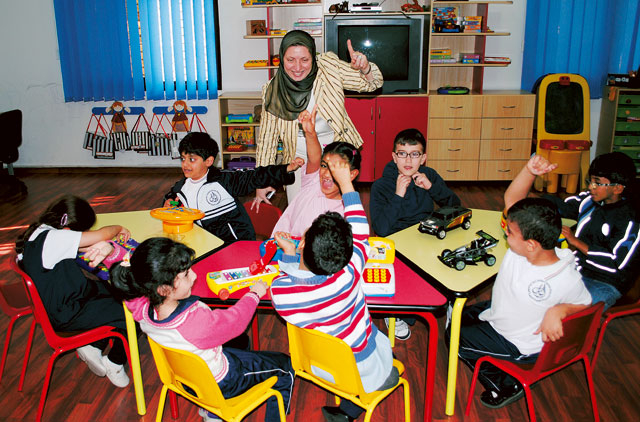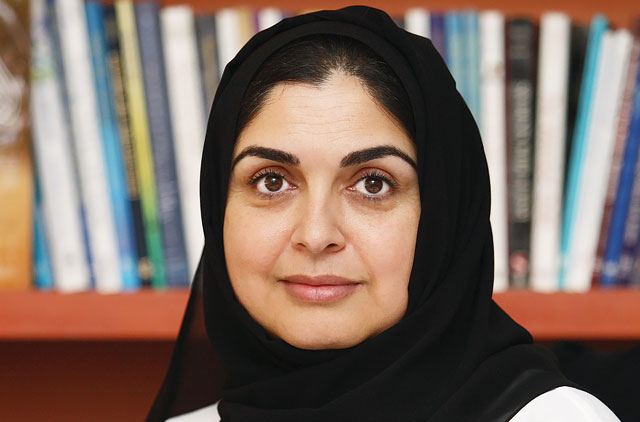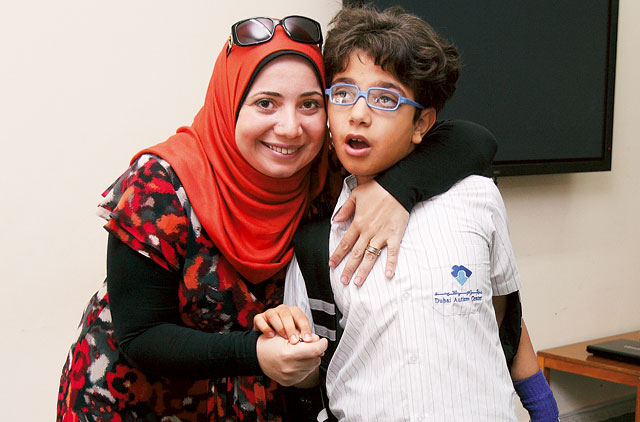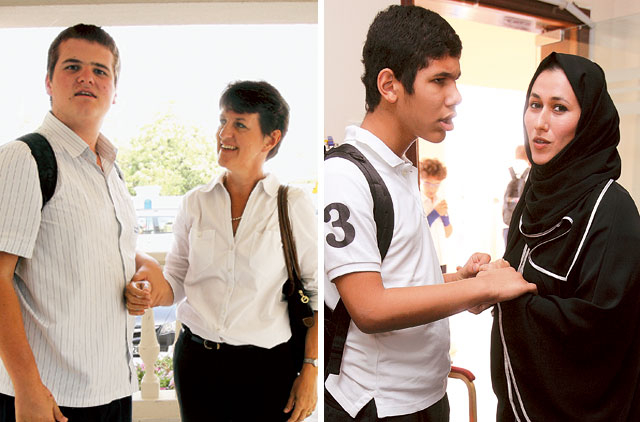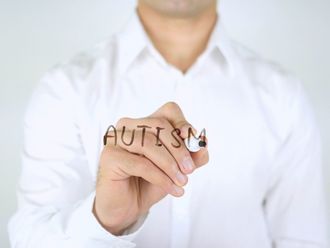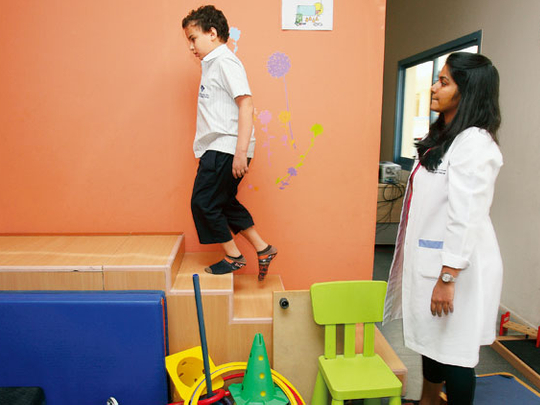
The Dubai Autism Centre has 46 children on its rolls although it can only accommodate 44. The number of children on its waiting list? Nearly 200.
At the Emirates Autism Centre in Abu Dhabi, which caters for 56 children, there is also a further 200 children waiting to join. The figures echo the sudden rise in the number of children being diagnosed with autism across the UAE.
While just 16 cases of autism were reported to Dubai Autism Centre in 2001, only two years later the number had rocketed to 30.
Worldwide the occurrence of autism has been documented as one child in 88 births. "In the UAE, although no official figures are available I can tell you we are on the same track," says Sara Ahmad Baker, head of the community service unit, Dubai Autism Centre. "Autism is definitely on the rise. There is more awareness of the condition and improved diagnosis and assessment techniques so more cases are coming to light. However, the more worrying factor is that there could be an as yet unidentified reason for this rise, something psychiatrists and doctors have yet to ascertain."
The UAE isn't alone. Autism cases appear to be on the rise across the world. The number of children diagnosed with the condition in the US has risen 23 per cent since 2009, with one in 88 children affected, according to a recent report from the US Centers for Disease Control and Prevention. Previous figures had shown the disorder was found in one in 110 American children. In fact, in a CNN report, Mark Roithmayr, president of US-based Autism Speaks, which among other things is dedicated to funding global biomedical research into the causes, prevention, treatments, and cure for autism, said the numbers show there is an epidemic of autism in the US.
Roithmayr says the rise in numbers is partly explained by "broadening of the diagnosis, improved detection and more awareness". But, he adds, "A large portion of the increase, some 50 per cent, remains unexplained.''
The number of children with autism in the UK has also risen 12-fold in the past 30 years and may be 50 per cent higher than previously suspected, according to a 2009 report by the Autism Research Centre at Cambridge University, published in the British Journal of Psychiatry.
Financial support for families
As more children are diagnosed in the UAE, the financial toll on families already struggling emotionally with the diagnosis is huge. At the Dubai Autism Centre (DAC), the fee for a child is Dh140,000 on average per year. The school charges each parent only Dh30,000. The rest of the funds come from donations and government funds.
Iman Farid, 33, whose son Ahmad, ten, has been at the DAC for the past eight years, says there has been a lot of improvement in his condition since enrolling him at the centre. He's become more responsive and communicates using picture cards. "But the high cost of treatment and the therapies are taking a steep financial toll on the family,'' she says.
At the Emirates Autism Centre, Amel Galal Sabry, founder and managing director, says the cost per student comes to nearly Dh70,000. Parents are charged Dh42,000 - she organises fund raisers and other initiatives to raise the rest of the amount. Her centre has helped over 200 children learn life skills. "This is the biggest challenge I face each year," she says.
Lack of funds has compelled Amel, 48, an Egyptian expatriate, to keep her modern therapy room unoperational as she cannot afford the cost of hiring occupational therapists to manage it. The room has multi-sensory activities that could help children with autism.
Amel's privately run autism centre opened in 2007 - a result of her experiences raising her third child Amr, 22, who is autistic.
He was two when he was diagnosed and Amel and her husband, Dr Mohammad Sharan, a paediatrician, took him to the Boston League School, an autism school in US. During the year there, Amel enrolled for several courses and learnt therapies to treat autistic children. On her return to Abu Dhabi in 2000, she converted Amr's room into a ‘learning centre' of sorts where he could be exposed to different sensory stimuli to maintain the pace of learning he had experienced in Boston.
"The learning centre helped Amr a lot,'' says Amel. That prompted her to campaign to get her son integrated into a mainstream school. It paid off and a year later Amr Sharaan started at school. He is currently in his senior year of high school at Jubilee Private School in Abu Dhabi, and keeping up with his peers.
Academic achievements are only part of Amr's success story - he is also an ace swimmer and has won several awards in swimming and horse riding at the school.
His success spurred Amel on to set up a multi-sensory room at the centre to help other autistic children.
"I use advanced international systems such as the Diagnostic Statistical Method and the Auditory Integration Technique (AIT) - an alternative therapy to stimulate and improve the way in which one processes auditory information - to assess a child at the school.
"Amr's condition gave a purpose to me to help others with similar conditions," says Amel, who has two other children - daughter Shereen, 24, who works for a management consultant firm in Abu Dhabi, and son Ahmad, 26, a doctor. Neither have the condition.
Life-changing diagnosis
There have been others too whose lives were changed after their child was diagnosed with autism. Iman, a pharmacist by profession, gave up her career to take care of her son Ahmad who was diagnosed with mild autism at the age of two. "He seemed to be very shy,'' recalls the Dubai resident, "and appeared to have problems speaking coherently.''
Worried, she and her husband Ayman took him to a speech therapist and then a psychologist who, after conducting a battery of tests, diagnosed Ahmad with autism. "It was a huge shock to us,'' says Iman who has two other children Sara, six, and Julie, three, who are not autistic. "I read up a lot about the condition and also researched on the net. He did not like to be held or cuddled. He used to be lost in his own world.
"Now, though, there is a marked difference in his attitude. He is more responsive.''
After learning that a balanced diet can play a part in improving his symptoms, Iman has put Ahmad on an organic, gluten-free diet - which nutritionists say has fewer additives and allergens that could affect autistic children - and used other alternative therapies such as homeopathy. They seem to have some positive effect on his condition, she claims.
The case of Khalifa, 12, is similar. His mother, Rasha Yahya, says, "When he was two, I would tell his teachers and his doctors that Khalifa was different from other children his age. He would not respond or interact with anyone. However, none of the doctors at the time could identify the problem.'' It was only when her son turned four that he was diagnosed.
"It was a life-changing moment,'' recalls Rasha, 35, who has three other children Mohammad, 11, Abdul Aziz, eight, and Ahmad, five, who do not have the condition. She gave up her job in a regional bank to take care of her son. He is now at Dubai Autism Centre.
Rasha's husband Abdulla Al Hosn works and lives in Abu Dhabi visiting Dubai only on weekends and the responsibility of bringing up Khalifa and his brothers, falls squarely on her. "I wish there were more support systems for families with autistic children," she says.
One of the major problems parents with autistic children face is that there are very few centres in the UAE that accept autistic youths over 18. Without regular training and therapy, the individual is likely to regress, says Sara.
What's next?
"I wish the mental and not chronological age is taken into consideration when deciding on the cut-off age for children in autism schools/centres," says Fiona Margesson, 49, from South Africa, whose son Gavin, 17, will have to leave DAC next year.
Gavin was diagnosed with severe autism at the age of two. "It has taken me years and years to accept Gavin's condition. At DAC he has progressed, learning to be independent and responding better. What will I do after next year?" she asks.
Gavin who is not able to communicate clearly if he is in pain, leaves Fiona guessing when he is restless or when he cries out. Recently she had to rush him to a clinic after he began sobbing. "There are very few clinics specialising in handling autistic individuals and I was lucky I found one that was very considerate and compassionate in dealing with my son," she says. Gavin had an ear infection, which was promptly treated.
It's not just individuals who are going out of their way to help autistic families. Even corporate bodies are showing their compassionate faces through various initiatives.
Amel says she has had a good response to her school from several organisations. "Dolphin Energy, for instance, donated a gym, The Emirates Foundation donated a printing press where students print designs on mugs and fabric; a Swedish company EMAL donated one of the most unique sensory rooms in our school. The room has equipment to stimulate all five senses and can help calm a hyperactive child."
In Dubai, Canon, has offered photography equipment to DAC so students can express themselves through photography.
Amel says: "Autisitic students are often gifted artistically. Many are good in sports as well." Her centre offers vocational guidance for students after 18 and is training students according to their ability to be able to be independent.
One of the most important factors is accepting children with autism and integrating them into the mainstream, she insists.
"I hope more schools do that. It would truly be the best way to show that you understand and care for these children,'' says Amel.
What is autism?
Autism is a neural developmental disorder characterised by impaired social interaction and communication. Children may suffer from mild, moderate or severe autism. It can be accompanied by attention deficit hyperactivity disorder (ADHD), mental retardation, dyslexia (difficulty in spelling words) or dispraxia (uncontrolled motor coordination).
Broadly speaking, autistic children have difficulty in verbal and non-verbal communication. The medical world is still struggling to fully understand this condition, which first made its appearance in the early 1900s. "In the US, autism is nearly five times more common among boys than among girls, with one in 54 boys identified compared with one in 252 girls," says Dr Thomas Frieden, the director of the Centre for Disease Control, in an online report on autism.
There are no genetic or medical tests that can detect autism, according to the Dubai Autism Centre. Although genetic disorders and toxic exposures are known to cause autism (or "autism-like symptoms" that may be misdiagnosed as autism), most cases of autism are considered "idiopathic", or "without known cause". Early detection and intervention are the best way to improve the sensory motor abilities of children affected by this condition.
While autism cannot be cured, the deterioration can be managed with early intervention and Individual Education Programmes (IEPs) to address the sensory, motor and communication needs of each affected child.
Children who appear to be suffering from the condition can be taken to Dubai Autism Centre for an assessment, says Sara Ahmad Baker, head of the community service unit, Dubai Autism Centre. Therapists examine the child and based on their assessment, an IEP is created for them.
"The earlier the child receives treatment the better,'' she says.
A mother's wish list for her child
Fiona Margesson hopes for the best for her 17-year old son Gavin
1. A center for Gavin to go to after he turns 18. Gavin's development is very, very slow but there is progress year on year. It would be wonderful to have a center for him to go to where he can continue to learn and develop better self help skills. Everyone needs a purpose to get out of bed in the morning and this would give Gavin that purpose. It worries me sick as to what he will do all day when he is just at home.
2. That those working for the good of autism all work together for the good of the people with autism and not for some other agenda - be it financial (so many people are making so much money out of this disability as desperate parents will try ANYTHING to improve their child's life) or ego .
3. For Gavin to be able to talk or communicate and to tell us when he is in pain or something is troubling him. It breaks our heart when he is upset and can't tell us why.
4. For people to be aware of autism and its complexities and not to look at a person with autism like an actor in a freak show.


